新概念英语第一册每课知识点1-38课
新概念英语第1册课文详注Lesson33_38

新概念英语第1册课文详注Lesson33~38【导语】新概念英语一共144课。
整本书无论是语法还是词汇,题材还是语句,都有其出彩之处。
正是因为如此,新概念英语更是经久不衰,深受广大英语学习者的喜爱。
小编为您整理了“新概念英语第1册课文详注Lesson33~38”,希望可以帮助到您!新概念英语第1册课文详注Lesson33~341.It is a fine day today.今天天气好。
句中的it是指天气。
又如:Is it cold today? 今天冷吗?No, it isn't. 不,不冷。
2.some clouds,几朵云。
some既可修饰可数名词,也可修饰不可数名词。
如:some tables一些椅子(可数名词),some milk一些牛奶(不可数名词)。
3.There are some clouds in the sky, but the sun is shining.天空中飘着几朵云,但阳光灿烂。
这句是并列句,由两个分句构成,连词but表明分句之间存在着对比及转折关系。
两分句之间大多要用逗号,有时可不用逗号。
4.Mr. Jones is with his family.琼斯先生同他的家人在一起。
句中with是介词,表示"和……一起"。
family是指"家里的人"或"家庭成员"。
5.They are walking over the bridge.他们正在过桥。
句中的over有"穿过"的意思。
又如:The aeroplane is flying over the river.飞机正在河上飞过。
The birds are flying over the house.鸟儿在屋上飞过。
over还可表不"在……上方"(不接触表面),如:The sky is over our heads.天空在我们头顶上。
新概念英语第一册笔记新版:第38课
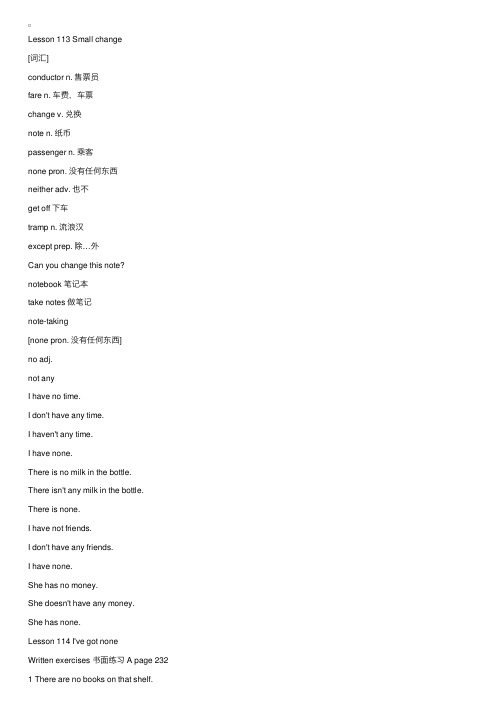
Lesson 113 Small change[词汇]conductor n. 售票员fare n. 车费,车票change v. 兑换note n. 纸币passenger n. 乘客none pron. 没有任何东西neither adv. 也不get off 下车tramp n. 流浪汉except prep. 除…外Can you change this note? notebook 笔记本take notes 做笔记note-taking[none pron. 没有任何东西]no adj.not anyI have no time.I don't have any time.I haven't any time.I have none.There is no milk in the bottle.There isn't any milk in the bottle. There is none.I have not friends.I don't have any friends.I have none.She has no money.She doesn't have any money.She has none.Lesson 114 I've got noneWritten exercises 书⾯练习 A page 232 1 There are no books on that shelf.2 I have got no money.3 There is no Coffee in this tin.4 I saw no cars in the street.Written exercises 书⾯练习 B page 232 1 No, I haven't got any milk.I've got no milk. I've got none.2 No, I haven't got any envelopes.I've got no envelopes. I've got none.3 No, I haven't got any magazines.I've got no magazines. I've got none.4 No, I haven't got any bread.I've got no bread. I've got none.Have you got any chocolate?I haven't got any.I've got no chocolate.I've got none.Have you got any envelopes?I haven't got any.I've got no envelopes.I've got none.Have you got any cake?I've got some.Have you got any biscuits?I've got some.Lesson 113 Small changeneitherLucy is a student.So am I.So are they.So is her brother.I like music.So does my brother.I don't like music.So does my father.So do they.They went to the party yesterday.So did I.They didn't go to the party yesterday.They are swimming.So is the boy.Sally can speak English.So can I.They must go Home.So must you.I have some change.So have I.They have some money.So has the tramp.So have the tramps.She isn't a student.Neither is he.Neither are they.She isn't a good person.Neither is her husband.Neither are they.I don't like you.Neither does my mother.Neither do my grandfather and grandmother.I can't swim.Neither can my brother.We didn't go there yesterday.Neither did Sally.They are singing.So is the girl.You mustn't smoke here.Neither must they.I don't have any change.Neither do they.I haven't any change.Neither have they.I haven't any either.Neither have I.So have I.So has she.I've got some.So have I.Written exercises 书⾯练习 C page 232nor1 Neither am I. I'm not hungry, either.2 Neither did I. I didn't meet him, either.3 Neither was I. I wasn't at church, either.4 Neither do I. I don't like ice cream, either.5 Neither can I. I can't swim, either.6 Neither am I. I am not a doctor, either.Written exercises 书⾯练习 D page 2321 So am I. I'm hungry, too.2 So did I. I met him, too.3 So was I. I was at church yesterday, too.4 So do I. I like ice cream, too.5 So can I. I can swim, too.6 So am I. I am a doctor, too.Lesson 113 Small changeYou must get off the bus.except prep. 除…外(不包括)besides 除了(包括)There are five girls besides two boys.They all went there except me.They all went there besides me.[课⽂注释]Fares, please!Trafalgar SquareHow many people are mentioned here in this dialogue? Where does the man want to go?What's the problem with him?What does he give to the conductor?What will he do?What does the conductor say?What will he do?Can the two men and two women change the note?Are they all millionaires?What happened at last?A man wants to go to the Trafalgar Square.But he doesn't have any change.But he hasn't any change.He gives a ten-pound note to the conductor.But the conductor can't change the note.some of the childrensome of the passengersThe conductor says that he will ask some of the passengers. But no passengers can change the note.They say they have no small change.There two tramps on the bus.They say that they can change the note.[课⽂]Fares, please! Trafalgar Square, please.I'm sorry, sir.I can't change a ten-pound note.Haven't you got any small change?I've got no small change, I'm afraid.I'll ask some of the passengers.Have you any small change, sir?I'm sorry. I've got none.I haven't got any either.Can you change this ten-pound note, madam?I'm afraid I can't. Neither can I.I'm very sorry, sir. You must get off the bus.None of our passengers can change this note.They're all millionaires!Except us.I've got some small change. So have I.Lesson 115 Knock, Knock![词汇]anyone pron. 任何⼈knock v. 敲,打everything pron. ⼀切事物quiet adj. 宁静的,安静的impossible adj. 不可能的invite v. 邀请anything pron. 任何东西nothing pron. 什么也没有lemonade n. 柠檬⽔joke v. 开玩笑Lesson 116 Every, no, any and some 不定代词every 每⼀个everyone 每⼀个⼈everybody 每⼀个⼈(多⽤于⼝语中)everything 每件事情everywhere 到处,每个地⽅none 没有no one 没有⼈nobody 没有⼈nothing 没什么事情nowhere 不在任何地⽅any 任何anyone 任何⼈anybody 任何⼈anything 任何事情anywhere 任何地⽅[any-⽤于疑问句与否定句中]some ⼀些someone 某⼈somebody 某⼈something 某件事情somewhere 某个地⽅Where are you?Somewhere in Beijing.不定代词可以做主语,宾语和表语Someone is knocking at the door.Nobody is absent.Something is wrong with my watch.Everything is all right.I know nothing about it.I didn't see anyone in the garden.She didn't talk to anyone at the party.She talked to nobody at the party.She is nobody.That is nothing. It's nothing.This is something. This is something we must decide first. He is somebody.I am nobody. But I have a dream.Everyone is asleep.Everybody is asleep.Everything is untidy.I looked for my pen everywhere.Is there anyone at Home?Is there anybody at Home?Is there anything in that box?I couldn't find my pen anywhere.There's no one at Home.There's nobody at Home.There is nothing in this box.Where did you go yesterday?Nowhere. I stayed at Home.There is someone in the garden.There is somebody in the garden.There is something under that chair.My glasses must be somewhere.You're wearing them.[词汇]asleep adj. 睡着(⽤作表语)glasses n. 眼镜Written exercises 书⾯练习 A page 2361 I did nothing.2 I saw no one.3 I went nowhere.4 I met nobody.Written exercises 书⾯练习 B page 2361 No, I didn't hear anything. I heard nothing.2 No, I didn't speak to anyone. I spoke to no one.3 No, I didn't go anywhere. I went nowhere.4 No, I didn't buy anything. I bought nothing.5 No, I didn't write to anybody. I wrote to nobody.6 No, I didn't meet anyone. I met no one.Written exercises 书⾯练习 C page 236look out of the windowhurry to workeatdrink1 Everyone's looking out of the window.2 Everyone's hurrying to work.3 Everyone's eating.4 Everyone's drinking lemonade.Written exercises 书⾯练习 D page 236不定式做宾语或宾语补⾜语beautiful flowersomething goodsomething bad动词不定式做定语I have got something to wear.I haven't got anything to wear.I have got nothing to wear.1 No, I haven't got anything to eat. I have got nothing to eat. He has got something to eat.2 No, I haven't got anything to do. I have got nothing to do. They have got something to do.3 No, I haven't got anything to drink. I have got nothing to drink.She's got something to drink.4 No, I haven't got anything to read. I've got nothing to read.He's got something to read.Lesson 115 Knock, Knock!Everything is quiet.I must go to the greengrocery[疑为笔误,应为greengrocer's] to buy some fruit.做⽬的状语It is impossible for sb. to do sth.It is possible for me to pass the Band 6 Exam.invite sb. to do sth.I invited some of my friends to have lunch yesterday.She is joking.Don't believe him.She is only joking.Who invited who to have lunch?How many people here are mentioned in this dialogue?Who are they?Where are Tom and Carol having lunch now?Why are they having lunch in garden?What does Jim want to drink?Is there any beer?What does Carol say?What does Carol ask Jim to drink?What is Carol doing?Is there anyone in the house?。
新概念英语第一册语法每节课重点总结
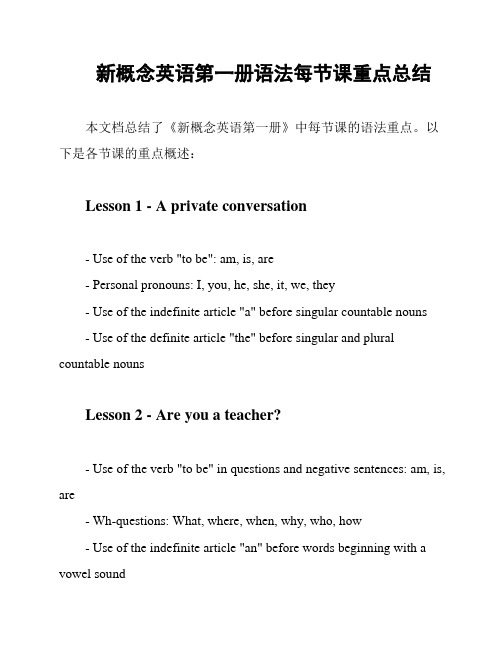
新概念英语第一册语法每节课重点总结本文档总结了《新概念英语第一册》中每节课的语法重点。
以下是各节课的重点概述:Lesson 1 - A private conversation- Use of the verb "to be": am, is, are- Personal pronouns: I, you, he, she, it, we, they- Use of the indefinite article "a" before singular countable nouns- Use of the definite article "the" before singular and plural countable nounsLesson 2 - Are you a teacher?- Use of the verb "to be" in questions and negative sentences: am, is, are- Wh-questions: What, where, when, why, who, how- Use of the indefinite article "an" before words beginning with a vowel soundLesson 3 - The first lesson- Use of the present simple tense: positive and negative sentences - Use of the frequency adverbs: always, usually, often, sometimes, never- Use of the preposition "at" to talk about specific timesLesson 4 - Please send me a card- Use of the imperative form: positive and negative sentences- Use of the infinitive form to give instructions: "to + base verb"- Use of the expression "please" to make polite requestsLesson 5 - An exciting trip- Use of the present continuous tense: positive and negative sentences- Use of the verb "to go" in present continuous tense: am/is/are + going- Use of the prepositions "to" and "at" to talk about destinations以上是《新概念英语第一册》各节课的语法重点总结。
新概念英语第一册各课语法知识汇总
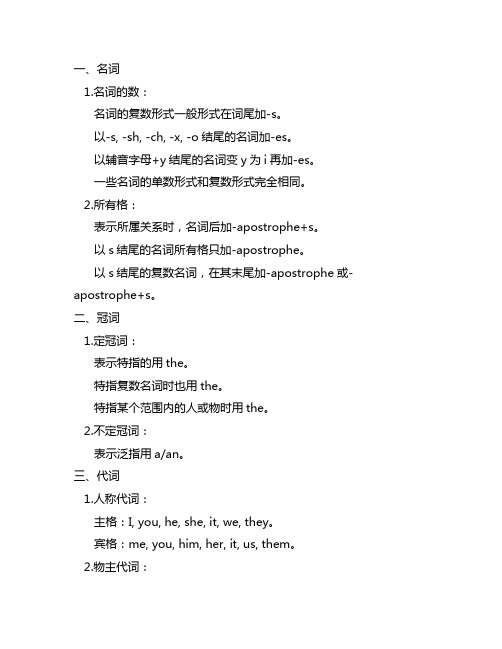
一、名词1.名词的数:名词的复数形式一般形式在词尾加-s。
以-s, -sh, -ch, -x, -o结尾的名词加-es。
以辅音字母+y结尾的名词变y为i再加-es。
一些名词的单数形式和复数形式完全相同。
2.所有格:表示所属关系时,名词后加-apostrophe+s。
以s结尾的名词所有格只加-apostrophe。
以s结尾的复数名词,在其末尾加-apostrophe或-apostrophe+s。
二、冠词1.定冠词:表示特指的用the。
特指复数名词时也用the。
特指某个范围内的人或物时用the。
2.不定冠词:表示泛指用a/an。
三、代词1.人称代词:主格:I, you, he, she, it, we, they。
宾格:me, you, him, her, it, us, them。
2.物主代词:形容词性物主代词:my, your, his, her, its, our, their。
名词性物主代词:mine, yours, his, hers, its, ours, theirs。
3.指示代词:this, that, these, those。
4.不定代词:some, any, no, every, each, many, much, few, little。
四、形容词1.形容词的用法:在名词前作定语。
在系动词之后作表语。
2.比较级和最高级:比较级:比较两者时,用比较级。
最高级:表示三者或三者以上之间的比较。
五、动词1.动词的三单形式:一般情况,动词第三人称单数在末尾加-s。
以辅音字母加y结尾的动词变y为i再加-es。
直接在词尾加-es的动词。
2.动词的现在进行时:am/is/are+动词的现在分词。
3.行为动词的过去式:动词过去式变化规则有规则动词和不规则动词。
六、副词1.副词的用法:修饰动词、形容词、副词。
表示时间、地点、原因、目的等。
2.比较级和最高级:副词比较级和最高级的构成。
七、介词1.介词的基本用法:表示方位、时间、原因、目的等。
新概念一册1-36课知识点总结
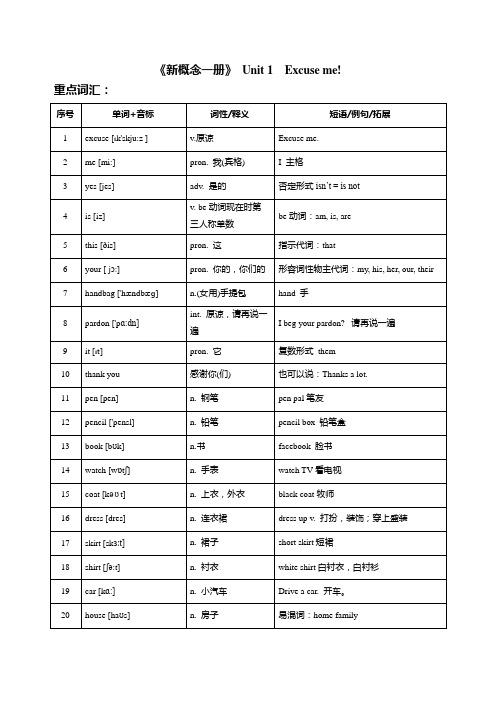
《新概念一册》Unit 1 Excuse me! 重点词汇:语法句型1【名称】be动词的一般疑问句及回答【含义及用法】be动词包括(am, is, are),be动词随着主语人称的变化而选择不同的形式。
E.g. - I am... (am 用于第一人称)-He/She/It is... (is用于第三人称单数)-We/You/They are... (are用于第一、三人称复数和第二人称)【构成】be动词在前面引导一般疑问句,询问是否的构成:be(am, is, are)+主语+其他?E.g. - Is this your pen? 这是你的钢笔吗?- Yes, it is. / No, it is not. (is not= isn't) 是的,它是。
/不,它不是。
语法句型2【名称】be动词的陈述句和一般疑问句互换【含义及用法】一般疑问句是疑问句的一种。
用以要求对方证实所述的事。
它是只用yes (是)或no(否)来回答的句子。
【结构】一般疑问句根据其结构又分为若干种。
主系表结构的一般疑问句构成方法是:将系动词提到主语前面。
即Is+主语+其他成分?如:陈述句:-This is your pencil. 这是你的铅笔。
一般疑问句:-Is this your pencil? 这是你的铅笔吗?变法:句子中含有be 动词(is)的肯定句如何变为一般疑问句。
带有be动词(is)的肯定句变为一般疑问句的口诀:be(is)提前,大标升。
(开头字母大写,标点符号变问号,语调用升调)例:-This is a handbag. 这是一个手提包。
- Is this a handbag? 这是一个手提包吗?《新概念一册》Unit 2 Sorry, sir.重点词汇:语法句型1【名称】一般疑问句(带有is)及其否定回答。
【含义及用法】一般疑问句是疑问句的一种,指用yes(是)或no(否)来回答的句子。
【结构】一般疑问句:Is + 主语+ 其它?肯定回答:-Yes, he/she/it is.-Yes, they/we/you are.否定回答:-No, he / she / it is not.-No, they/we/you are.E.g. -Is this your pen? 这是你的钢笔吗?-No, it is not. 不,它不是。
新概念英语第一册 词汇表1-38课
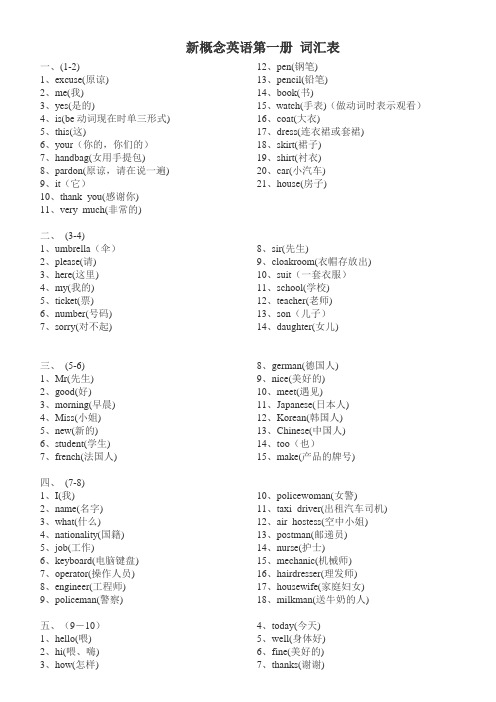
新概念英语第一册词汇表一、(1-2)1、excuse(原谅)2、me(我)3、yes(是的)4、is(be动词现在时单三形式)5、this(这)6、your(你的,你们的)7、handbag(女用手提包)8、pardon(原谅,请在说一遍)9、it(它)10、thank you(感谢你)11、very much(非常的) 12、pen(钢笔)13、pencil(铅笔)14、book(书)15、watch(手表)(做动词时表示观看)16、coat(大衣)17、dress(连衣裙或套裙)18、skirt(裙子)19、shirt(衬衣)20、car(小汽车)21、house(房子)二、(3-4)1、umbrella(伞)2、please(请)3、here(这里)4、my(我的)5、ticket(票)6、number(号码)7、sorry(对不起) 8、sir(先生)9、cloakroom(衣帽存放出)10、suit(一套衣服)11、school(学校)12、teacher(老师)13、son(儿子)14、daughter(女儿)三、(5-6)1、Mr(先生)2、good(好)3、morning(早晨)4、Miss(小姐)5、new(新的)6、student(学生)7、french(法国人) 8、german(德国人)9、nice(美好的)10、meet(遇见)11、Japanese(日本人)12、Korean(韩国人)13、Chinese(中国人)14、too(也)15、make(产品的牌号)四、(7-8)1、I(我)2、name(名字)3、what(什么)4、nationality(国籍)5、job(工作)6、keyboard(电脑键盘)7、operator(操作人员)8、engineer(工程师)9、policeman(警察) 10、policewoman(女警)11、taxi driver(出租汽车司机)12、air hostess(空中小姐)13、postman(邮递员)14、nurse(护士)15、mechanic(机械师)16、hairdresser(理发师)17、housewife(家庭妇女)18、milkman(送牛奶的人)五、(9-10)1、hello(喂)2、hi(喂、嗨)3、how(怎样)4、today(今天)5、well(身体好)6、fine(美好的)7、thanks(谢谢)8、goodbye(再见)9、see(见)10、fat(胖的)11、woman(女人)12、thin(瘦的)13、tall(高的)14、short(矮的)15、dirty(脏的)16、clean(干净的) 17、hot(热的)18、cold(冷的)19、old(老的)20、young(年轻的)21、busy(忙的)22、lazy(懒的)六、(11-12)1、whose(谁的) blue(蓝色的)3、perhaps(大概)4、white(白色的)5、catch(抓住)6、father(父亲)7、mother(母亲)8、blouse(女衬衫)9、sister(姐妹)10、tie(领带)11、brother(兄弟)12、his/her(他/她的)七、(13-14)1、colour(颜色)2、green(绿色)3、come(来)4、upstairs(楼上)5、smart(时髦的、也代表聪明)6、hat(帽子)7、same(相同的)8、lovely(可爱的、秀丽的) 9、case(箱子)10、carpet(地毯)11、dog(狗)12、grey(灰色)13、brown(棕色)14、red(红色)15、yellow(黄)16、orange(橙色)八、(15-16)1、customs(海关)2、officer(官员)3、girl(女孩)4、friend(朋友)5、passport(护照)(pass/通过、port/港口)6、tourist(旅行者)7、these(这些this复数)九、(17-18)1、employee(雇员)2、hard-working(勤奋的)3、sales reps(推销员)(sales/销售)4、man(男人)5、office(办公室)6、assistant(助手)十、(19-20)1、matter(事情)2、children(孩子)(child的复数)3、tired(累、疲乏)4、boy(男孩)5、thirsty(渴)6、sit down(坐下)7、right(可以)8、ice cream(冰淇淋)9、big(大的)10、small(小的)11、open(开着的)12、shut(关着的)13、light(轻的)14、heavy(重的)15、long(长的)16、shoe(鞋子)17、grandfather/mother(祖父/母) 十一、(21-22)1、give(给)2、one(一个)3、which(哪一个)4、empty(空的)5、full(满的)6、large(大的)7、little(小的)8、sharp(锋利的)9、small(小的)10、big(大的) 11、blunt(钝的)12、box(盒子)13、glass(杯子)14、cup(茶杯)15、bottle(瓶子)16、tin(罐头)17、knife(刀子)18、fork(叉子)19、spoon(勺子)十二、(23-24)1、on(在.....之上)2、shelf(架子、搁板)3、desk(课桌)4、table(桌子)5、plate(盘子)6、cupboard(食厨)7、cigarette(香烟) 8、television(电视机)9、floor(地板)10、dressing(梳妆台)11、magazine(杂志)12、bed(床)13、newspaper(报纸)14、stereo(立体声音响)十三、(25-26)1、mrs(夫人)2、kitchen(厨房)3、refrigerator(电冰箱)4、right(右边)5、electric(带电的、可通电的)6、left(左边)7、cooker(炉子)8、middle(中间)9、of(属于.....的)10、room(房间)11、cup(杯子)12、where(在哪里)13、in(在.....里)十四、(27-28)1、living room(客厅)2、near(靠近)3、window(窗户)4、armchair(扶手椅)5、door(门)6、picture(图画)7、wall(墙)8、trousers(长裤)十五、(29-30)1、shut(关门)2、bedroom(卧室)3、untidy(乱,不整齐)4、must(必须,应该)5、open(打开)6、air(使.....通风,换换空气)7、put(放置)8、clothes(衣服)9、wardrobe(大衣柜)10、dust(掸掉灰尘) 11、sweep(扫)12、empty(倒空)13、read(读)14、sharpen(削尖)15、put on(穿上)16、take off(脱掉)17、turn on(开(电灯)18、turn off(关(电灯))十六、(31-32)1、garden(花园)2、under(在...之下)3、tree(树)4、climb(爬、攀登)5、who(谁)6、run(跑)7、grass(草、草地)8、after(在....之后)9、across(横过、穿过)10、cat(猫)11、type(打字) 12、letter(信)13、basket(篮子)14、eat(吃)15、bone(骨头)16、clean(清洗)17、tooth(牙齿)18、cook(做(饭))19、milk(牛奶)20、meal(饭)21、drink(喝)22、tap((水)龙头)十七、(33-34)1、day(日子)2、cloud(云)3、sky(天空)4、sun(太阳)5、shine(照耀)6、with(和.....在一起)7、family(家庭)8、walk(走路、步行)9、over(跨越、在...之上)10、bridge(桥)11、boat(船) 12、river(河)13、ship(轮船)14、fly(飞)15、aeroplane(飞机)16、sleep(睡觉)17、shave(刮脸)18、cry(哭、喊)19、wash(洗)20、wait(等)21、jump(跳)十八、(35-36)1、photograph(照片)2、village(村庄)3、valley(山谷)4、between(在...之间)5、hill(小山)6、another(另一个)7、wife(妻子)8、along(沿着)9、bank(河岸) 10、water(水)11、swim(游泳)12、building(大楼、建筑物)13、park(公园)14、into(进入)15、beside(在...旁)16、off(离开)十九、(37-38)1、work(工作)2、hard(努力地)3、make(做)4、bookcase(书橱、书架)5、hammer(锤子)6、paint(上漆、涂)7、pink(粉红色)8、favourite(最喜欢的)9、homework(作业)10、listen(听)11、dish(盘子、碟子)新概念英语第一册词汇表一、(1-2)1、(原谅)2、(我)3、(是的)4、(be动词现在时单三形式)5、(这)6、(你的,你们的)7、(女用手提包)8、(原谅,请在说一遍)9、(它)10、(感谢你)11、(非常的) 12、(钢笔)13、(铅笔)14、(书)15、(手表)(做动词时表示观看)16、(大衣)17、(连衣裙或套裙)18、(裙子)19、(衬衣)20、(小汽车)21、(房子)二、(3-4)1、(伞)2、(请)3、(这里)4、(我的)5、(票)6、(号码)7、(对不起) 8、(先生)9、(衣帽存放出)10、(一套衣服)11、(学校)12、(老师)13、(儿子)14、(女儿)三、(5-6)1、(先生)2、(好)3、(早晨)4、(小姐)5、(新的)6、(学生)7、(法国人) 8、(德国人)9、(美好的)10、(遇见)11、(日本人)12、(韩国人)13、(中国人)14、(也)15、(产品的牌号)四、(7-8)1、(我)2、(名字)3、(什么)4、(国籍)5、(工作)6、(电脑键盘)7、(操作人员)8、(工程师)9、(警察) 10、(女警)11、(出租汽车司机)12、(空中小姐)13、(邮递员)14、(护士)15、(机械师)16、(理发师)17、(家庭妇女)18、(送牛奶的人)五、(9-10)1、(喂)2、(喂、嗨)3、(怎样)4、(今天)5、(身体好)6、(美好的)7、(谢谢)8、(再见)9、(见)10、(胖的)11、(女人) 12、(瘦的)13、(高的)14、(矮的)15、(脏的)16、(干净的)17、(热的)18、(冷的)19、(老的)20、(年轻的)21、(忙的)22、lazy(懒的)六、(11-12)1、(谁的)2、(蓝色的)3、(大概)4、(白色的)5、(抓住)6、(父亲)7、(母亲)8、(女衬衫)9、(姐妹)10、(领带)11、(兄弟)12、(他/她的)七、(13-14)1、(颜色)2、(绿色)3、(来)4、(楼上)5、(时髦的、也代表聪明)6、(帽子)7、(相同的)8、(可爱的、秀丽的) 9、(箱子)10、(地毯)11、(狗)12、(灰色)13、(棕色)14、(红色)15、(黄)16、(橙色)八、(15-16)1、(海关)2、(官员)3、(女孩)4、(朋友)5、(护照)(pass/通过、port/港口)6、(旅行者)7、(这些this复数)九、(17-18)1、(雇员)2、(勤奋的)3、(推销员)(sales/销售)4、(男人)5、(办公室)6、(助手)十、(19-20)1、(事情)2、(孩子)(child的复数)3、(累、疲乏)4、(男孩)5、(渴)6、(坐下)7、(可以)8、(冰淇淋)9、(大的) 10、(小的)11、(开着的)12、(关着的)13、(轻的)14、(重的)15、(长的)16、(鞋子)17、(祖父/母)十一、(21-22)1、(给)2、(一个)3、(哪一个)4、(空的)5、(满的)6、(大的)7、(小的)8、(锋利的)9、(小的)10、(大的) 11、(钝的)12、(盒子)13、(杯子)14、(茶杯)15、(瓶子)16、(罐头)17、(刀子)18、(叉子)19、(勺子)十二、(23-24)1、(在.....之上)2、(架子、搁板)3、(课桌)4、(桌子)5、(盘子)6、(食厨)7、(香烟) 8、(电视机)9、(地板)10、(梳妆台)11、(杂志)12、(床)13、(报纸)14、(立体声音响)十三、(25-26)1、(夫人)2、(厨房)3、(电冰箱)4、(右边)5、(带电的、可通电的)6、(左边)7、(炉子)8、(中间)9、(属于.....的)10、(房间)11、(杯子)12、(在哪里)13、(在.....里)十四、(27-28)1、(客厅)2、(靠近)3、(窗户)4、(扶手椅)5、(门)6、(图画)7、(墙)8、(长裤)十五、(29-30)1、(关门)2、(卧室)3、(乱,不整齐)4、(必须,应该)5、(打开)6、(使.....通风,换换空气)7、(放置)8、(衣服)9、(大衣柜) 10、(掸掉灰尘)11、(扫)12、(倒空)13、(读)14、(削尖)15、(穿上)16、(脱掉)17、(开(电灯)18、(关(电灯))十六、(31-32)1、(花园)2、(在...之下)3、(树)4、(爬、攀登)5、(谁)6、(跑)7、(草、草地)8、(在....之后)9、(横过、穿过)10、(猫)11、(打字) 12、(信)13、(篮子)14、(吃)15、(骨头)16、(清洗)17、(牙齿)18、(做(饭))19、(牛奶)20、(饭)21、(喝)22、((水)龙头)十七、(33-34)1、(日子)2、(云)3、(天空)4、(太阳)5、(照耀)6、(和.....在一起)7、(家庭)8、(走路、步行)9、(跨越、在...之上)10、(桥)11、(船)12、(河)13、(轮船) 14、(飞)15、(飞机)16、(睡觉)17、(刮脸)18、(哭、喊)19、(洗)20、(等)21、(跳)十八、(35-36)1、(照片) 3、(村庄)3、(山谷)4、(在...之间)5、(小山)6、(另一个)7、(妻子)8、(沿着)9、(河岸)10、(水) 11、(游泳)12、(大楼、建筑物)13、(公园)14、(进入)15、(在...旁)16、(离开)十九、(37-38)1、(工作)3、(努力地)3、(做)4、(书橱、书架)5、(锤子)6、(上漆、涂)7、(粉红色)8、(最喜欢的)9、(作业)10、(听)11、(盘子、碟子)。
新概念英语第一册重点词汇和语法(完整版)
新概念英语第一册语法总结1-4 一般疑问句:1-2 一般疑问句肯定回答 3-4 一般疑问句否定回答5-14 特殊疑问句15-16 一般疑问句复数17-18 特殊疑问句复数19-20 名词单数21-24 不定代词。
双宾结构25-28 there be 句型,介词用法29-30 祈使句31-36 现在进行时,there be 句型分析,介词复习37-40 一般将来时, be going to41-42不可数名词,量词的用法43-46 情态动词 can47-50 一般现在时55-56 频度副词57-58 时间59-60复习不可数名词,量词的用法61-64 must 用法65-66 时间表达法:直接,间接,反身代词,情态动词复习67-72 一般过去时主系表结构73-75 一般过去时主谓宾结构77-78 情态动词的否定疑问句,时间介词79-80 need must 情态动词81-82 have –had83-84 现在完成时进行时,将来时对比85-86 have been to / have gone to87-88否定疑问句89-90 may 情态动词91-94 will 一般将来时过去/现在/将来95-96 had better97-98 伴随状语,名词性物主代词99-100 宾语从句101-102 直接引语,间接引语,103-104 too, very, enough105-106动词不定式107-112 形容词的比较级,最高级113-114 否定,肯定倒装115-116 不定代词117-118 时间状语从句,过去进行时119-120 过去完成时121-124 定于从句125-126 must / have to127- 132 情态动词表推测133-136直接引语,间接引语,137-138 条件状语从句139-140宾语从句141-144 被动语态Lesson 1 Excuse me1. Words1) excuse (1)重音(2)与sorry 的区别(3)Excuse 用的不同场景a. 请别人让路b. 引起别人的注意c. 打断别人的谈话d. 可以当n. 借口 eg. No excuse. 别找借口,没有借口。
新概念英语第一册课堂笔记-第38课
新概念英语第一册课堂笔记-第38课新概念英语第一册课堂笔记-第38课复习语法点1.陈述句主语+be动词This is a pen./ They are students.am / is / are否定形式在be后加not2.一般疑问句、特殊疑问句一般疑问句是以be动词、情态动词(must、can)、do或does,did,have,has,was,were打头的句子。
Are you a student? / Is she a worker?一般疑问句能够用简单的“是”或“不是”来回答用什么样的动词提问,就用什么样的动词来回答特殊疑问句是由特殊疑问词和一般疑问句来构成。
特殊疑问词有:what、how……特殊疑问句一般不能够用简单的“是”或“不是”来回答,而要根据不同的疑问词来回答。
选择疑问句以be动词构成的选择疑问句+or构成选择Are you a student or a worker.Is she an American or an English?所有能做为一般疑问句后面加一个or选项,来构成选择疑问句。
在回答选择疑问句时,要根据具体的情况来回答。
名词所有格名字+’s代词的用法主格,宾格,形容词性的物主代词,名词性的物主代词主格只能做主语宾格用在介词和动词之后形容词性的物主代词不能单独使用,后面要跟名词名词性的物主代词只能单独使用,相当于形容词性的物主代词加名词名词所有格能够是形容词性的,也能够是名词性的。
如果是形容词性时,后面加名词;如果是名词性的,后边不加东西。
介词短语做后置定语一个词来修饰成分时,放在修饰词的前边;而一个词组来做修饰成分时,放在被修饰词的后边。
the book on the desk介词的学习1.跟在be动词之后2.在普通的动词之后put on / take off动词加介词构成新的意义学习介词的规则:1.记清介词本身表示的意义2.1)跟在be动词之后,表示方位(这种情况较多)2)与普通的行为动词构成新的意义名词种类有五种:普通名词、物质名词、专有名词、集体名词、抽象名词可数名词的单、复数概念There be句型1.表示某处有某物2.使用的类型:1)There is…+(单数的可数名词或不可数名词)2)There are…+(可数名词的复数)冠词有不定冠词或定冠词两类。
新概念第一册每课知识点整理
新概念第一册每课知识点整理Lesson 1 - Excuse me!一、重点单词。
1. excuse.- 作动词,意为“原谅;宽恕”,例如:Excuse me.(打扰一下。
)- 作名词,意为“借口;理由”,如:Don't make excuses.(不要找借口。
)2. me.- 人称代词宾格,“我”,在句中作宾语,如:Give it to me.(把它给我。
)二、重点句型。
1. Excuse me!- 用于引起别人注意、请求让路、打断别人说话等场合,是比较礼貌的用法。
三、语法点。
简单的日常交际用语的使用。
Lesson 2 - Is this your…?一、重点单词。
1. pen.- 名词,“钢笔”。
2. pencil.- 名词,“铅笔”。
3. book.- 名词,“书”。
4. watch.- 名词,“手表”;也可作动词,“观看”,如:watch TV(看电视)。
二、重点句型。
1. Is this your pen?- 这是一般疑问句,其结构为“be动词(is/are等)+主语+其他”,回答可以是“Yes, it is.”或者“No, it isn't.”三、语法点。
1. 一般疑问句的构成与回答。
2. 指示代词this的用法,用来指代离说话者较近的人或物。
Lesson 3 - Sorry, sir.一、重点单词。
1. umbrella.- 名词,“雨伞”。
2. please.- 副词,用于请求别人做某事时表示礼貌,如:Please open the window.(请打开窗户。
)二、重点句型。
1. Is this your umbrella?- 同Lesson 2中的一般疑问句结构。
2. Sorry, sir.- “sorry”表示歉意,“sir”是对男性的尊称。
三、语法点。
1. 继续巩固一般疑问句。
2. 尊称“sir”的用法。
Lesson 4 - Is this your…?一、重点单词。
(完整版)新概念第一册每一课重点的总结
新概念一共144课,其中单课为课文,双课为语法和练习。
整本书是以单数课为正课,并附带有插图,而双数课则是针对单数课所讲的内容有针对性地进行练习。
学习目标:
(1)达到初中或高中一年级的英语水平
(2)掌握英语初级语法
(3)应对一般的日常对话
(4)掌握800至1200个单词,其中的800个词汇全部是英语日常用语中出现频率最高的词汇。
上册(1—68课)
上册所学单词在600左右,含有名词、形容词、动词及少数介词,其中名词占大多数,会学习到较多的生活用词。
语法点归纳:
(1) 1--68课本中出现的时态:
Lesson 31—34 现在进行时
Lesson 37--40 第一次出现be going to 的将来时
Lesson 51—56 一般现在时
Lesson 67—76 为一般过去式
中册(69—106课),大约有300单词,包含名词、动词、形容词、副词、介词,其中所学的动词和副词会有所增加。
课文中出现的时态有:
Lesson 67—76 为一般过去式
Lesson 83—90 为现在完成时
Lesson 91—96 为一般将来时
下册(107—144课),大约有300个单词语法点归纳:
1、L107-108形容词的比较级,最高级
2、L117-118时间状语从句和过去进行时
3、L121-122定语从句
4、L119-120 过去完成时
5、L139-140宾语从句
6、L141-144被动语态。
- 1、下载文档前请自行甄别文档内容的完整性,平台不提供额外的编辑、内容补充、找答案等附加服务。
- 2、"仅部分预览"的文档,不可在线预览部分如存在完整性等问题,可反馈申请退款(可完整预览的文档不适用该条件!)。
- 3、如文档侵犯您的权益,请联系客服反馈,我们会尽快为您处理(人工客服工作时间:9:00-18:30)。
新概念英语第一册每课知识点Lesson1-2 Excuse me! 对不起!Is this your…?这是你的…吗?语言点:与陌生人说话或引起别人的注意。
Excuse me.译成汉语:劳驾或打扰一下。
Yes?什么事?Yes. 是的。
Pardon?请再说一遍。
Thank you very much.非常感谢。
语法点:主系表结构this为主语,名词做表语一般疑问句以及它的肯定回答。
Is this your handbag? Yes, it is.Lesson 3-4 Sorry, sir. 对不起,先生。
Is this your…?这是你的…吗?语言点:询问某物是某人的吗语法点:简单的否定句。
It isn’t my coat.一般疑问句的否定形式Is this your umbrella?—Is this not your umbrella?Is this your ticket?---Is this not your ticket? (回答时要根据事实来回答)Lesson 5-6 Nice to meet you。
很高兴见到你。
What make is it? 它是什么牌子的?语言点:如何介绍别人。
This is Miss Sophie Dupont. Nice to meet you.询问物品的牌子:What make is +单数可数名词?语法点:主语为第三人称单数的主系表结构。
She is French. He is German. It’s a V olvo.(L6)a/an 的使用。
选择疑问句---一般选择疑问句和特殊选择疑问句Lesson 7-8 Are you a teacher? 你是教师吗?What’s your job?你是做什么工作的?语言点:如何自我介绍和相互认识。
询问职业的表达法。
What’s your job?询问国籍的表达法。
What nationality are you?语法点:主语为第二人称的主系表结构。
Are you French?特殊疑问句Who, what, whose, how old, how many…Lesson 9-10 How are you today? 你今天好吗?Look at…看…语言点:朋友或熟识的人之间如何相互问候。
How are you? I’m fine. / I’ m very well. Thanks, and you? Nice to see you.语法点:主系表结构:主语+be动词+形容词,用来描述主语的外形特征。
She is tall/ old/ clean/thin/ lazy.介词短语表示位置near the window on the television on the wallLesson11-12 Is this your shirt? 这是你的衬衫吗?Whose is this/that…?这…是谁的或那…是谁的?This/ That is + 物主代词+ 单数可数名词。
语言点:询问东西是谁的whose 引导的问句语法点:名词所有格特殊疑问句:whose +名词+is this/that?This/ That is +名词所有格/所有格代词区别:This is my book.---- Whose book is this? (做形容词)This book is mine.---Whose is this book? (做代词)表示所有关系的物主代词(名词性和形容词性)Lesson 13-14 A new dress 一件新连衣裙What colour’s your …? 你的…是什么颜色的?语言点:询问颜色和复习各种颜色的词汇。
不可分割的the same英语整十数字的表达法,百位数的英文表达法。
句子中的斜体字的意义及读法。
语法点:特殊疑问句---What colour is your…what 作形容词,修饰colour 祈使句---意义,用法,结构,否定式人称代词主格、宾格及相应的be动词Lesson 15-16 Your passports, please. 请出示你们的护照。
Are you…? 你们是…吗?语言点:猜国籍的问句:Are you +表国籍的词汇?翻译成“你是…国人吗?”询问物品的颜色:What colour are your…?你们的…是什么颜色的?Are these your…? 这些是你/你们的…吗?语言点:名词的复数变化方法,及读音---清清浊浊(1)复习一般疑问句不定冠词a, an的用法Lesson 17-18 How do you do? 你好!What are their jobs?他们是做什么工作的?语言点:初次相识相互问候. How do you do? (注意回答相同:How do you do!) 询问职业:What’s your job?/What are you? /What do you do?Who引导的疑问句,用来对人的身份或姓名提问。
Who is that girl? She is Lily, she is my classmate.How 引导的问句,用来询问人的状态或特征:How is your mother? She is very well. She is very nice.What 引导的问句,用来询问人的职业:What is your mother? She is a doctor.整百数字和千位数字的英文表达法语法点:名词复数的变化方法及发音及不规则名词的复数变化方法(2)Lesson 19-20 Tired and thirsty 又累又渴Look at them! 看看他们/ 它们!语言点:询问发生了什么事:What’s the matter with sb. / 代词的宾格?What’s wrong with sb./代词的宾格?语法点:主系表结构:主语+be动词+形容词(表达主语的状况)There be 结构复习祈使句Lesson 21-22 Which book? 哪一本书?Give me/ him/ her/ us/ them a…给我/他/她/我们/他们一个… Which one? 哪一个语言点:which 引导的单数问句:译为“哪一个”。
One 作代词的用法语法点:双宾语结构:相关动词-give给,hand递给,tell告诉,show指给、展示,pass 传递定冠词the 的用法总结指示代词:this, that复习物主代词和人称代词宾格Lesson 23-24 Which glasses? 哪几只杯子?Give me/ him/ her/ us/ them some…给我/ 他/她/ 我们/ 他们一些…Which ones? 哪些?语言点:which 引导的复数问句:翻译为“哪一些”语法点:复习双宾语结构的用法。
复习代词宾格指示代词:these, those 介词短语做后置定语The ones on the shelf. (架子上的)那些。
代词one的复数:onesLesson 25-26 Mrs. Smith’s kitchen 史密斯太太的厨房Where is it? 它在哪里?语言点:描述房间内的物品布局及物品的特征(写景作文)Where引导的疑问句,用来询问人/ 物在哪里?语法点:there be 句型的用法介词:in, on, at 用法归纳,in the middle of 复习冠词a , an, the 的用法整千位和整万位数字的英文表达法Lesson 27-28 Mrs. Smith’s living room. 史密斯太太的客厅Where are they? 它们在哪里?语言点:描述房间内物品的布局。
Some 和any 的用法。
语法点:复习there be 结构。
介词短语作表语:The pictures are on the wall.介词:near 在…附近千位和万位数字的英文表达法Lesson 29-30 Come in, Amy. 进来,Amy. What must I do? 我应该做什么?语言点:表示命令的短句语法点:祈使句表命令的用法。
情态动词must 的用法。
Lesson 31-32 Where’s Sally? Sally 在哪里?What’s he/she/ it doing? 他/她/ 它在做什么?语言点:where 引导的特殊疑问句,询问人或物在哪里。
必背短语:in the garden, under the tree, climb the tree, run across the grass, run after 必背句子:I beg your pardon? 你说什么?/ 请再说一遍。
What about + 名词(人/物)?用在上下文语境中,用来询问对方情况或征求别人的意见。
例:What about the dog? 那么狗在哪呢/ 狗在干什么呢?整万位数、十万位数和百万位数的英文表达法。
语法点:介词短语做表语---表人或物所在的位置。
She’s in the garden.介词短语做状语:She’s sitting under the tree. / It’s running across the grass.现在进行时:用法,结构,句式转换。
Lesson 33-34 A fine day 晴天What are they doing? 他们在做什么?语言点:描述情景(作文)It 的用法归纳:表天气、时间、金钱、距离、重量、温度等必背短语:a fine day晴天, in the sky在天上, be with s.b和…在一起, walk over the bridge走过桥, on the river在河面上, look at看…, under the bridge在桥下, fly over从…上空飞过十万位和百万位数字的英文表达法语法点:现在进行时Lesson 35-36 Our village 我们的村庄Where…?在哪里语言点:描述照片里的景象必背短语:a photograph of …的一张照片,in a valley在山谷里,between two hills 在两山之间,be on a river …靠近一条河,along the bank of the river 沿着河岸,on the left在左边,on the right在右边,swim across the river 游过河,school building 学校大楼,beside a park在一座公园旁边,comeout of…从…里出来,some of…当中的一些go into…进入到…里复习数字1-12的英文表达法语法点:复习定冠词the 的用法。
